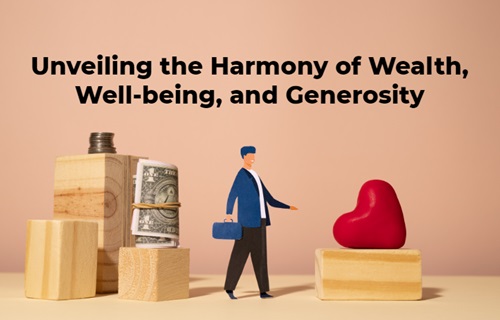Unveiling the Harmony of Wealth, Well-being, and Generosity the contemporary landscape of personal finance, the confluence of money, happiness, and altruism stands as a pivotal intersection that shapes our lives profoundly. In this article, we delve into the intricate dynamics of how financial prosperity intertwines with well-being and the remarkable impact of altruistic endeavors.
Unveiling the Harmony of Wealth, Well-being, and Generosity

The Ripple Effect: Money and Happiness
Wealth Beyond Currency
In our pursuit of financial success, it’s imperative to recognize wealth beyond mere monetary terms. True prosperity encompasses not just the size of one’s bank account but extends to experiences, relationships, and personal growth. Research indicates that individuals who view wealth holistically tend to derive more profound and sustainable happiness.
The Psychology of Financial Well-being
Understanding the psychological dimensions of financial well-being is paramount. As we accumulate wealth, the sense of security and autonomy it provides becomes a potent catalyst for happiness. We explore the science behind this relationship, shedding light on the positive correlation between financial stability and emotional well-being.
Altruism: A Catalyst for Fulfillment
Beyond Self: The Altruistic Advantage
Altruism, the selfless concern for others, emerges as a transformative force in the pursuit of a meaningful life. Our exploration reveals how acts of kindness and generosity contribute not only to societal welfare but also significantly enhance personal fulfillment. Unveiling the science behind the “helper’s high,” we underscore the reciprocal nature of altruism and its profound impact on individual happiness.
The Altruistic Money, Happiness, and Altruism
Contrary to conventional wisdom, our article uncovers the paradox that suggests the more we give, the more we receive. Drawing on studies that explore the correlation between altruistic acts and financial success, we present a compelling argument for the symbiotic relationship between generosity and personal wealth.
Strategies for Integrating Money, Happiness, and Altruism
Creating a Holistic Financial Plan
Crafting a financial plan that aligns with personal values and includes provisions for charitable contributions is integral. We provide actionable insights into developing a comprehensive strategy that not only fosters financial growth but also cultivates a sense of purpose and happiness.
Cultivating Altruism in Daily Life
Our article offers practical tips on infusing altruism into everyday routines, emphasizing that even small gestures can have a profound impact. From volunteering to conscious consumerism, we present a roadmap for integrating altruistic practices into daily life, contributing to both personal fulfillment and societal well-being.
Final Thoughts: Weaving a Fulfilling Existence
Ultimately, living a truly wealthy life transcends monetary riches. It encompasses holistic well-being, including nurturing relationships, cherishing experiences, and engaging in altruistic acts that create a ripple effect of happiness. While money has its place, the profound impact of relationships, experiences, and kindness on personal happiness should not be overlooked in our pursuit of a fulfilling life.
In this complex tapestry of life, striking a balance between financial stability, enriching experiences, meaningful connections, and altruistic behavior may pave the way for a truly content and fulfilled existence. The interplay of money, happiness, and altruism unravels a narrative that goes beyond traditional measures of success, inviting individuals to explore a more holistic approach to well-being.
Conclusion
In summary, the intricate relationship between money, happiness, and altruism showcases the need for a comprehensive understanding of well-being. While financial stability plays a role, it’s the quality of relationships, meaningful experiences, and acts of kindness that truly define a fulfilled existence. The pursuit of a content life involves navigating the intricate threads of this complex tapestry, acknowledging the interplay between monetary resources, emotional satisfaction, and altruistic endeavors.
FAQs on Money, Happiness, and Altruism
- Can money truly buy happiness?
- Money positively influences happiness up to a certain point, but beyond a threshold, its impact diminishes.
- What is the significance of relationships in well-being?
- Relationships play a paramount role in fostering genuine happiness, as highlighted by the Harvard Study of Adult Development.
- How does cultural background influence the impact of altruism on happiness?
- Cultural differences suggest varying effects of altruism in individualistic and collectivist cultures, as explored by Weiss-Sidi and Riemer.
- Is there a limit to how much money contributes to happiness?
- Studies indicate diminishing returns in well-being, particularly after reaching a certain income level, as seen in Killingsworth’s research.
- How can individuals incorporate acts of kindness into their lives for improved well-being?
- Acts of kindness, as emphasized by Titova and Sheldon’s study, have an immediate positive impact on personal well-being.